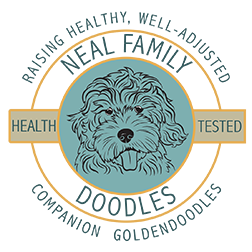What is it that sets Neal Family Doodles' puppies apart from others?
We follow the Puppy Culture program, a science-backed system developed by Jane Messineo Lindquist (Killion), a breeder that has 33 years of experience in puppy rearing. The motto of Puppy Culture is "The Proof is in the Puppies"; no statement could be more true. Puppy Culture puppies are like no other!
Once our mama reaches the appropriate age for breeding, going into heat kicks our litter preparation into high gear. For the health and well-being of the mama and her potential pups, progesterone blood testing is done multiple times to determine the ovulation date. Reputable breeders use this testing as a basic health protocol that could save the life of our mamas and their puppies by pinpointing an accurate window for whelping the litter. Bringing our puppies into the world during the safe window for whelping has an important impact on the passive immunity acquisition they receive within the first four hours of life when the pups receive colostrum from their mama. This opportunity is extremely short and the importance of colostrum consumption is monumental.
Breeders have more opportunity to make a dramatic impact on a puppy’s ultimate personality than anyone else ever will. By the time the puppy goes to his new home, much of that opportunity has already been lost. The Puppy Culture protocol prepares me for what to do, and when, to take advantage of my power as a breeder.
In the first 14 days, the neurological system is forming, and we influence the way it forms. Research shows that stressing newborn puppies very slightly benefits them for the rest of their lives.
Early Neurological Stimulation, developed by Carmen L Battaglia, is a series of 5 exercises performed daily on days 3 through 16 of the pup's life. For the rest of the puppies' lives, they will have stronger heartbeats, stronger heart rates, an adrenalin system that moves faster when they need it, more resistance to disease, and greater tolerance to stress. This is a gift you can only give them once and only during this small window of time.
Once our puppies have opened their eyes, their ears have developed, and they can successfully toddle around, we begin exposing them to sounds and actions that startle them so they develop a healthy recovery response. This prepares them for the future when these types of sounds are a part of everyday life - slamming doors, items being dropped, a vacuum, clanging dishes and pots, music, etc. During this time, there is a lack of fear so we can focus on the single task of startle recovery.
We strive to raise dogs with the emotional intelligence to connect with you on a deep and trusting level. Emotional intelligence can be taught to young puppies during the socialization process. The seven key things that will nurture the emotional intelligence of the puppy and enable him to make the connections that define the human-animal bond are:
- Communication - dog and human language skills
- Emotional Stability - the ability to recover easily from fear and cope with stress and frustration in a socially acceptable manner.
- Habituation - familiarity with the maximum number of things - facilitation of the "so what" response
- Enrichment - the view that novelty and challenges are opportunities for enrichment rather than things to be feared or avoided
- Health - the physical wellness and motor skills that will allow the puppy to develop in a neurologically and physically sound way
- Skills - learned behaviors that will allow him to function in human society
- Love - the desire to seek out the company of both dogs and humans as an emotionally positive experience
Scientific studies have shown that the most critical elements of an enriching environment are learning and problem solving. Animals who are given learning and problem solving activities in addition to toys and social interaction grow up to be more stable, less easily stressed, and less easily frightened with better learning and memory than animals who are given the same toys and social interaction but without learning or problem solving activities. Activities are introduced to the puppies to challenge them and to develop problem solving skills at the appropriate time based on their stage of development. They learn to cope with frustration as they are empowered to "figure it out" on their own.
We give our puppies a voice beginning at the halfway mark of their time with us through the system of the Communication Trinity. They will learn about training markers, how to offer behaviors for reward, and how to "mand" to get your attention when they want to communicate with you. This is an amazing week -- they will show so much growth through learned communication skill development.
We begin the potty training process during the time the puppies are with us although the process is far from over when they leave at eight weeks of age. Our pups rely on us to know when they will most likely need to go out to potty. Here are a few tips and signs that indicate pups should be taken out to potty:
- 10 minutes after play begins
- 15 minutes after eating
- immediately after waking
If your pup is playing or you are holding him and he abruptly stops and begins walking around sniffing, he needs to potty. Take him out! If he is near the door, even if he just walks by it, take him out.
A puppy, even at 12 weeks, is unable to hold their bladder for long periods. They need to be taken out to potty at least once per hour. Some puppies may be completely potty trained at this age, but most require additional time. We have given our puppies a head start before they leave us however, they require your attention for several weeks to months to finish the job.
